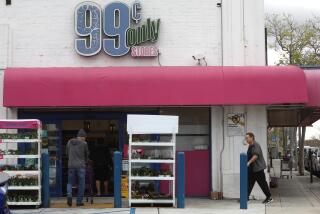Salons lose their allure as clients cut expenses
- Share via
With stock portfolios in the toilet, layoffs looming everywhere and credit hard to come by, many folks are looking for places to cut back.
That includes their own heads.
Consumers are slashing their budgets by skipping visits to upscale hair salons and opting for inexpensive stylists. Some are getting haircuts less often or dyeing their own locks at home.
“I’d rather not be pampering myself right now,” said Melissa Moats, a Studio City voice-over artist who decided to color her own hair with a $20 bottle from Target rather than pay the usual $120 for a cut and color at the salon. She then went to Supercuts for a $15 trim.
Things are fine in the voice-over business right now, she said, but she figured it would be good to save. “All of us -- no matter what we do -- are looking at ways to cut back.”
Beauty products behemoth Procter & Gamble Co. on Wednesday reported a 20% gain in sales of home hair coloring product Nice-n-Easy in its fiscal first quarter, and double-digit sales growth for its Head & Shoulders brand. Meanwhile, its Professional Hair Care line saw a small drop in sales.
Consumers’ move toward cheaper products is showing up in the bottom lines of companies that might be expected to benefit from a trend toward penny-pinching.
Regis Corp., which owns Cost Cutters, Supercuts and Sassoon Salon, last week posted a 30% drop in quarterly profit compared with a year ago.
Daniel Hofkin, an analyst at brokerage William Blair & Co. in Chicago, said companies such as Regis were hurting because customers weren’t buying expensive products at their salons.
“People are reducing the frequency of their visits, and some people are even cutting their hair at home,” Hofkin said.
Or as Regis Chief Executive Paul D. Finkelstein put it: “Consumers are cutting back and trading down, and as a result we are seeing a slowdown in spending and visitation patterns.”
Hofkin predicted that consumers would continue to cut back on discretionary products: luxuries such as perfume and costly hair concoctions. That’s good news for discount beauty supply stores.
“A lot of people come and buy their own color and try to do it themselves,” said a manager at Kristy’s Beauty Supplies & Salon in West L.A. “They’re saying they’d rather do it themselves than spend the money.”
Malie Jarrett, a Northridge resident who works for a pharmaceutical company, said she’s been dyeing her own hair lately instead of spending $150 at a salon.
In addition to saving money, she said there’s another upside: “Every three months I can change the color.”
Don Carroll, owner of Dej Salon in Sherman Oaks, said he’d seen a 10% decrease in customers lately, even though he resisted raising prices in line with inflation. His clients are coming in less frequently between haircuts and highlights, even though his $60 price tag is pretty cheap by Los Angeles standards.
Down the street at Montage Hair Studio, owner Bob Martin said his stylists were doing their best to keep their customers by giving them price breaks or extra services, such as touch-ups or highlights. “It’s about giving customers a little more for their money,” he said.
Anne Thompson, owner of Whackos Hair Salon in Studio City, charges $25 for a haircut and said she’d had about 20 new customers in recent months. Women are coming to her because they can’t afford their old salons anymore, she said.
For those worried that if the economy stays bad we’ll become a nation of bad haircuts and strangely colored tresses, there is one note of hope. According to Flowbee International, sales of the Flowbee, a $69.95 vacuum-powered hair-cutting machine for do-it-yourselfers, haven’t picked up noticeably of late.
Besides, there will always be people like Studio City real estate agent Stami Karakasidis. She tried a cheap stylist but felt that “she didn’t have the pizazz.” So she returned to her old hairdresser, who charges $75 for a cut.
“You go to look good to feel good,” she said.
Penny Wise is a street-level look at how Southern Californians are stretching their dollars in a sputtering economy.
--
More to Read
Inside the business of entertainment
The Wide Shot brings you news, analysis and insights on everything from streaming wars to production — and what it all means for the future.
You may occasionally receive promotional content from the Los Angeles Times.











